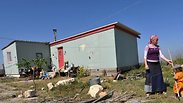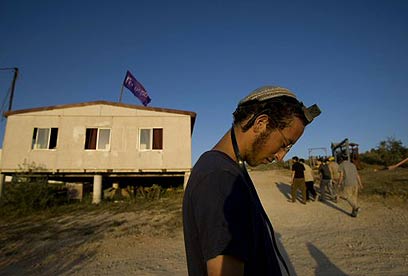
Illegal West Bank outpost. Years-long manipulation claiming a considerable price
צילום: AFP
Settlement enterprise based on illegality and deception
Op-ed: The culture of 'winking' at wrongdoers is shared by government ministries, MKs, IDF officers, gatekeepers and law enforcers – and even the Supreme Court.
Rehavam Ze'evi was the Central Command chief in the first years of the settlement enterprise in the West Bank. One day, he hosted a group of members of the Knesset's Foreign Affairs and Defense Committee. He proudly shared with them how he had built the community of Gitit in the northeastern West Bank.

In the first stage, the lands of Aqraba, a Palestinian village, which were near the site chosen for the community, were sprayed from the air by the army. In the second stage, a verbal approval arrived from a government official.
And then, Ze'evi boasted, I cut off all contact for three days. No phone calls, no messages. The government could have searched for me, but it wouldn't have found me. I built the settlement underground, like the Homa Umigdal communities (a settlement method used by Zionist settlers in Mandatory Palestine during the 1936–39 Arab Revolt).
Lova Eliav, the man who founded the Lachish region and Arad, heard Ze'evi bragging and was shocked. It's one thing establishing a community behind the Mandate government's back, he told me later; it's another thing establishing it behind the Israeli government's back.
At the time, Eliav was still naïve. He believed that there was a link between the state's laws, the government's statements and what actually happened on the ground. He later realized that the huge settlement enterprise, which developed from the 1967 occupation, was based entirely on winking at wrongdoers.

The government said it would dismantle any outpost built against its decisions, while its ministries made sure to provide new settlers with fuel, fences, generators and caravans, allot soldiers to protect them and pave ways to ease their movement (Archive photo: Reuters) (צילום: רויטרס)
This applies to the Golan Heights, to Sinai, to Gaza, and mainly to the West Bank. The government announced that it would dismantle any outpost built against its decision, but at the same time its ministries made sure to provide the new settlers with fuel, fences, generators and caravans, allotted soldiers to protect them and paved ways to ease their movement.
The winking culture wasn't limited to the government ministers. Knesset members, government workers, IDF officers, gatekeepers and law enforcers all winked, willingly or under compulsion. The most problematic winking partner was the Supreme Court. In a series of High Court rulings, it authorized the policy based on illegality and deception.
In the short periods in which the centrist-leftist parties ruled the country, they didn't dare deal with the winking culture. They had a slew of constraints: Inconvenient coalition partners, fear of right-wing protests, fear that their bargaining power would be affected in the middle of negotiations, and mainly embarrassment.
The years-long manipulation has claimed and is claiming a considerable price. It is presenting Israel as a seemingly criminal country and distorting the rule of law in the domestic arena. Manipulation corrupts. The most blatant example of corruption in this area comes from the investigation revelations in the Yisrael Beytenu affair. It turns out that funds transferred with a wink, under the table, found their way not only to the Samaria hills, but also into associates' pockets. Governmental money is like water: It flows to the lowest place.
Knesset Member Eitan Cabel (Zionist Union) will submit to the Knesset this week a private bill attempting to deal with this corrupt culture. Its headline is "Protecting public funds (banning funding and services to unauthorized outposts)".
The bill forbids public bodies to fund or provide services to an unauthorized outpost; it also forbids public bodies to fund private bodies which assist outposts. The offense is defined as criminal; the punishment is up to two years in prison and a fine. In addition, the government is permitted to reduce the funding of bodies suspected of assisting outposts, and personally fine every person who ordered the assistance to the outposts.
"Funding and providing services to outposts on behalf of the state is a serious violation of the rule of law and negatively affects Israel's foreign relations," Cabel wrote in the commentary to the bill.
Many Israelis will agree with this statement, including quite a few people in the right. They have also had enough of walking on the edge of illegality and of the repeated surrender to the demands of violent, unrestrained groups.
The bill makes sense. The problem is that it is only raised when the center-left is in the opposition. The proposal will be rejected, like other good proposals. The manipulation will remain.










